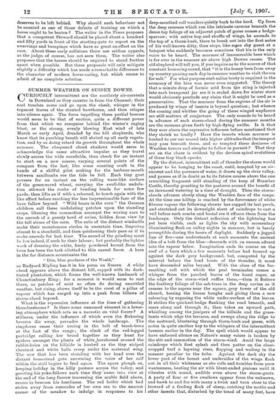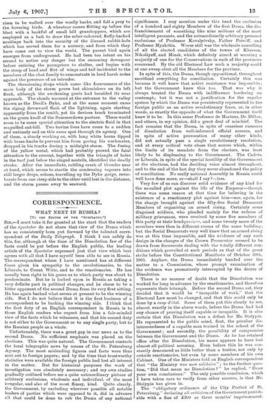SUMMER WEATHER ON SUSSEX DOWNS.
CURIOUSLY intermittent are the southerly air-currents in Downland as they saunter in from the Channel; their
cool touches come and go upon the cheek, whisper in the topmost leaves of the stunted hawthorns, and then relapse into silence again. The force impelling these partial breezes would seem to be that of suction, quite a different power from that which we recognise behind the winter's raging blast, or the strong, evenly blowing East wind of late March or early April, dreaded by the hill shepherds, who know that its parching breath will shrivel up all early vegeta- tion, and by so doing retard its growth throughout the whole summer. The chequered cloud shadows would seem to acknowledge the same attractive impulse as they travel slowly across the wide cornfields, then check for an instant to start on a new course, varying several points of the compass from the last, like some coasting craft in the hands of a skilful pilot making for the harbour-mouth between sandbanks ere the tide be full. Each tiny gust presses for an instant on the rolling wave-like surface of the green-eared wheat, carrying the swell-like undula- tion athwart the ranks of bending heads for some few yards; then lifts as if with a rebound, to touch again with the like effect before reaching the less impressionable face of the bare fallow beyond. "Wild boars in the corn" the German children call these undulating patches upon the standing crops, likening the commotion amongst the waving ears to the onrush of a greedy herd of swine, hidden from view by the tall stems of the corn. The sails of the distant windmills make their monotonous circles in uncertain time, lingering almost to a standstill, and then quickening their pace as if to make amends for lost time. The sound of the grinding must be low indeed, if such be their labour; but probably the lighter work of dressing the white, finely powdered kernel from the bran has been the task allotted to this casual force. A haze in the far distance accentuates the "Dim, blue goodness of the Weald,"
as Rudyard Kipling has it in his poem on Sussex. A white cloud appears above the distant hill, capped with its dark- tinted plantation, which forms the well-known landmark of Chanctonbury Ring ; for a moment it would seem to rest there, as patches of mist so often do during unsettled weather, but rising, shows itself to be the crest of a pillar of vapour which has surged up into a peak from billows of storm-cloud beyond.
What is the repressive influence at the time of gathering thunderstorms ? Is there some unnamed element in a lower- ing atmosphere which acts as a narcotic on vital forces ? A stillness, under the influence of which even the flickering breezes die away, pervades the whole landscape. The ringdoves cease their cooing in the belt of beech-trees at the foot of the range ; the cluck of the red-legged partridge calling her brood together as they hunt for spiders amongst the plants of white .horehound around the rabbit-holes on the hillside is hushed as the tiny striped 'chestnut and white balls creep under the maternal wing.
The cow that has been standing with her head over the distant homestead gate answering the voice of her calf within the stall begins to feed again. The spare plough ox, keeping holiday in the hilly pasture across the valley, and greeting his yoke-fellows each time they *come into view at the end of the long furrow traversing the arable field above, ceases to bemoan his loneliness. The red heifer which had stolen away from comrades of her own sex to the nearest corner of the meadow 'to indulge in responses to his deep-mouthed call wanders quietly back to the herd. Up from the deep recesses which run like intricate caverns beneath the dense top foliage of an adjacent patch of gorse comes a hedge- sparrow; with active hop and shuffle of wings, he ascends to the top of a thorn-bush, there to break out into the first notes of his well-known ditty, then stops, like sqpie shy guest at a banquet who suddenly becomes conscious that his is the only voice to be heard. The murmur of innumerable bees which is for ever in the summer air above high Downs ceases. The old shepherd will tell you, if you inquire as to the source of that constant humming sound, that "it is the honey bees from away up country passing each day in summer weather to visit the sea for salt." For what purpose such saline booty is required in the economy of the hive was never even suggested. The theory that a minute drop of formic acid from tile sting is injected into each hexagonal jar ere it is sealed down for winter store would obviously preclude any claim that it might be used as a preservative. That the murmur from the regions of the air is produced by wings of insects is beyond question ; but whence the coming and whither the going of these winged wayfarers are still matters of conjecture. The only sounds to be beard in advance of each storm-cloud during the summer months are the screams given forth by high-flying swifts. Is it that they soar above the repressive influence before mentioned that they shriek so loudly ? Have the insects whose murmur is hushed to our ear soared into higher altitudes that the tempest may pass beneath them, and so tempted these denizens of Wealden towers and steeples to follow in pursuit ? That they are on the chase is evident by the devious spiral evolutions of these tiny black specks.
By the distant, intermittent roll of thunder the storm would appear to be hanging to the coast, until, tempted by an air- current and the presence of water, it draws up the river valley, and pauses as if in doubt as to its future course above the one crumbling fragment still standing of the keep of Bramber Castle, thereby granting to the pastures around the benefit of au increased watering in a time of drought. Then the storm- clouds advance slowly along the Wealden face of the range. At the time one hilltop is reached by the forerunner of white fibrous vapour the following shower has capped its last perch, and stretched out its downright sheet of raindrops to cast a veil before each combe and hostel ere it effaces them from the landscape. Only the distant reflection of the lightning has yet been visible, such as lights the sky with momentary illuminating flash on sultry nights in summer, but is barely perceptible during the hours of daylight. Suddenly a jagged line of fire—one understands at such moments the ancient idea of a bolt from the blue—descends with an unseen advent into the vapour below. Imagination ends its course on the roof of a barn which a few moments before had loomed up against the dark grey background, but, computed by the interval before the loud boom of the thunder, it must have descended miles beyond. With the close of the far- reaching roll with which the peal terminates comes a whisper from the parched leaves of the hazel copse, as the edge of the storm-wind ruffles them,—then it flutters the feathery foliage of the ash-trees in the deep ravine as it crosses to the aspens near the square, grey tower of the old church, tossing the lissom boughs and giving them a new colouring by exposing the white under-surface of the leaves. It strikes the qrtickset-hedge flanking the road beneath, and roars along and through it; then takes an upward path, whistling among the junipers of the hillside and the grass- bents which edge the terraces, and sweeps along the ridge to the eastward, blustering through thorn-bush and gorse, with notes in quite another key to the whispers of the intermittent breezes earlier in the day. The spell which would appear to have enforced silence on Nature's many voices is broken by the stir and commotion of the storm-wind. Amid the large raindrops which first splash and then patter on the close- cropped turf a lapwing rises, flapping and wailing in the manner peculiar to the tribe. Against the dark sky the lower part of the breast and undersides of the wings flash out in all their whiteness as she rolls and tumbles from pure wantonness, beating the air with blunt-ended pinions until it vibrates with sound, audible even above the storm-gusts. A party of four or five swallows appear from the unknown, and hawk to and fro with many a twist and turn close to the leeward of a feeding flock of sheep, catching the moths and other insects that, disturbed by the tread of many feet, have
risen to be wafted over the woolly backs, and fall a prey to the hovering birds. A wheatear comes flitting up before the blast with a beakful of small hill grasshoppers, which are employed as a bait to draw the sober-coloured, fluffy-backed nestlings back into the security of the disused rabbit-hole which has served them for a nursery, and from which they have come out to view the world. The parent bird again emerges from underground. He had been too intent on his errand to notice any danger but the oncoming downpour before enticing the youngsters to shelter, and begins with the stoop of head and flirt of wings and tail incidental to the members of the chat family to remonstrate in loud harsh notes against the presence of an intruder.
The threatening drops which came like forerunners of the main body of the storm prove but skirmishers on its left flank, although the awakening gusts had heralded its near approach. The clouds wavered at the entrance to the valley known as the Devirs Dyke, and at the same moment came the zigzag downward flash of the lightning, again starting apparently from the zenith, yet its devious track terminated on the green knoll of the Summerdown pasture. There would seem to be some special attraction to the electric fluid in that magnified ant-hill. Two bovine lives have come to a sudden and untimely end on this same spot through its agency. One of them, a sturdy working ox, with long white horns tipped with brass-knobs to prevent him from goring his workmates, dropped in his tracks during a midnight storm. The fusing of the yellow metal, which had probably proved the fatal attraction to the current, together with the triangle of holes in the turf just below the singed nostrils, identified the deadly stroke. After the immediate, rattling crash of thunder near at hand, which seems to startle the condensing vapours into still larger drops, echoes, travelling up the Dyke gorge, rever- berate from one steep side to the other until lost in the distance, and the storm passes away to seaward.















































 Previous page
Previous page